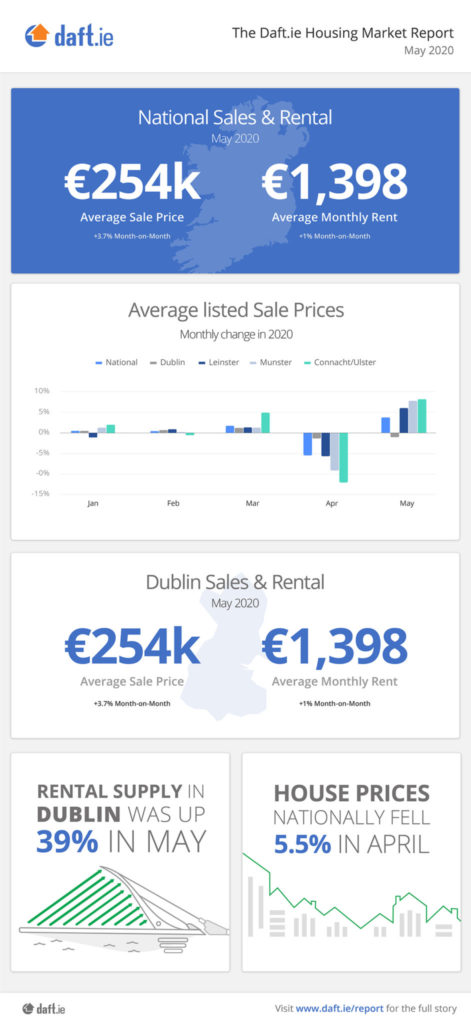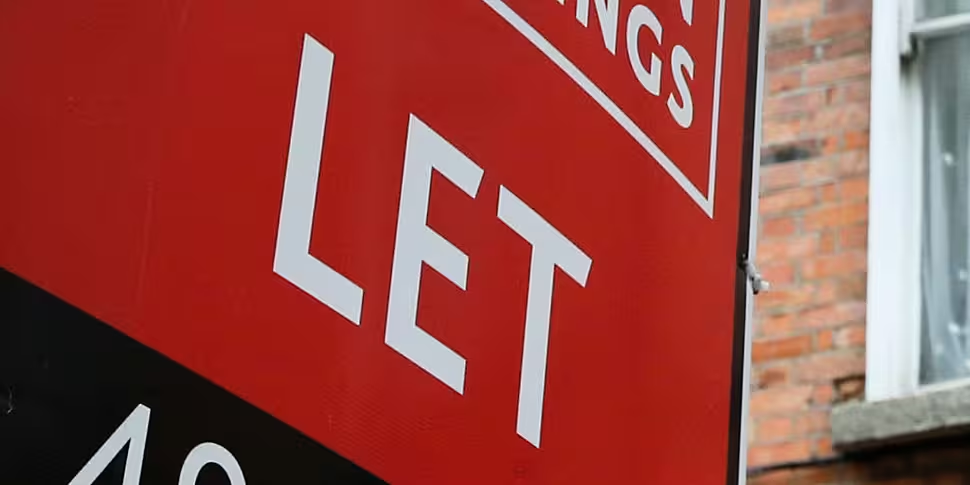An economist has warned that any COVID-19 disruption to the construction sector will see rents climb higher.
It comes as a new report says the average monthly rent nationwide in May was €1,398 - 0.7% higher than a year ago.
The number of homes available to rent in May was up slightly nationwide – by 6%, compared to the same month last year.
However supply for Dublin has surged and is up 40%, while the rest of the country saw reduced supply.
Ronan Lyons is an economist at Trinity College Dublin and author of the report.
He told Newstalk Breakfast the crisis in the sector still has to be addressed.
"This is one of the things that the next government will have to deal with.
"Just because there's a huge shock to demand now, it's a temporary large shock and it may persist into kind of a small fall-off - we might be 5 or 10% poorer in a year's time because of COVID.
"We're just coming out of an extraordinary lockdown where unemployment went up to something close to 30% - that's not going to last.
"When we get back into some sort of normal, we will still be faced with the same issues: the owner-occupier market is largely in balance, the number of new homes being built for people borrowing a mortgage and looking to buy a new home - that's largely OK.
"What we're missing is the private rental and social rental sectors; there's been basically no new homes added in those two sectors over the last 10/12 years.
"And they're the sectors where there's significant extra need.
"So we could find ourselves returning to shortages pretty quickly if COVID were to translate into reduced capacity in the construction sector.
"There are about 30,000 built-to-rent homes in the pipeline over the next few years... if they don't happen, obviously the sector will be negatively affected by that.
"Rents will be even higher than if they're not built, and we haven't even really started yet fixing social housing".
But he said the sector is already moving from uncertainty to risk.
"They key thing is the volatility: there was a huge fall in prices of properties put up for sale in April, and then they came back again a little bit in May.
"I think what it tells us is that we as a society don't really know what's coming next.
"Those people who did go up on the market in April were either more nervous, or in some other way chose to cut their prices.
"Those who went up in May had obviously made a slight rebound in their optimism".
"This is a new format of report - it's sale and rental, and it's going to be monthly from now on - because of what's happening in the market at the moment.
"And if you look at the rental market in comparison, it's far less volatile - and that makes a bit of sense when you think about somebody entering a one or two year transaction, versus someone entering a 20 or 30 year transaction.
"There's more pressure to get it right when it's for 20 or 30 years, that's why you see slightly bigger swings on the sales side".
"When COVID first hit it was about uncertainty, people didn't know what the country was going to look like in three, six, nine months time or indeed in two or three year's time.
"I think we've moved from uncertainty to risk, where we have a better understanding - no disease has been studied so much so quickly - so we're moving from uncertainty into risk.
"And I think in settings like the housing market that will reduce the volatility.
"I would certainly expect that the more there is unemployment in say a year's time as a result of what's happening now... that is definitely going to translate into a fall-off in housing demand.
"The target anyway for policy-makers is to try and restore as many of the jobs and as much of the income that's being lost over the last couple of months.
"But the more that that's successful, the more that we'll see that translating into both the sale and the rental market".
The latest report shows the average monthly rent nationwide last month was €1,398 - 0.7% higher than a year ago - while the average listed sale price was €245,545, 1.6% lower than in May last year.
Sale prices are now lower than a year ago in all parts of the country except Leinster (outside of Dublin), where they remain 2.1% above levels seen for 2019.
In Munster, however, the average listed price in May was 5.7% lower than a year ago.
 Source: Daft.ie
Source: Daft.ieIn contrast, May 2020 rents were on average higher than those seen a year previously - but in Dublin they were unchanged, while in Connacht-Ulster they were 1.7% lower.
Trends in availability show starker differences between sale and rental.
Across the country as a whole, there were 22% fewer homes for sale on June 1st than on the same date a year ago.
Daft said this reflects a collapse in new ads of homes for sale, with just one-quarter the number of homes put on the market in May than the same month in 2019.
In the rental segment, however, the number of homes available to rent in May was up slightly nationwide: by 6%, compared to the same month last year.
But supply for Dublin has surged and is up 40%, while the rest of the country saw reduced supply.
In the rest of Leinster, there were just 1,234 rental listings across both April and May, compared to almost 1,900 in the same two months in 2019.
Rental prices nationwide did fall 2.1% in April, compared to March, but this was far less than was seen in the sales market.









